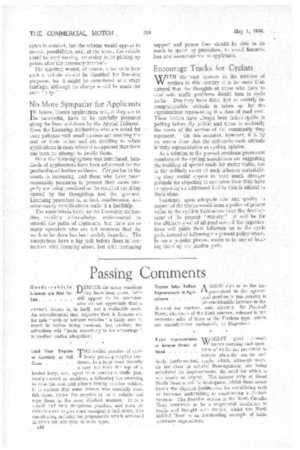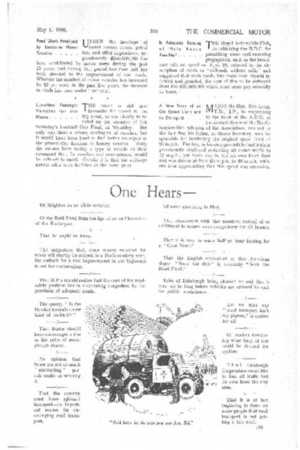Passing Comments
Page 72

Page 73

If you've noticed an error in this article please click here to report it so we can fix it.
Goods-vehicle nESPITE the many warnings Licences are Not for Lorthat have been given, there
Sale still appear to be operators who do not appreciate that a carrier's licence is, in itself, not a realizable asset. An advertisement that indicates that A licences are for sale "with or without vehicles" is fairly sure to result in replies being 'received, but whether the advertiser will "learn something to his advantage" is another matter altogether !
Load Your Empties THE foolish practice of care as Carefully as Full lessly packing empties con
Cases tinues. In a large town recently
a case fell from the top of a loaded lorry, and, apart from causing a traffic jam, nearly caused an accident, a following bus swerving to miss the case and almost hitting another vehicle. It is curious that some drivers who carefully store full cases, throw -the empties on to 'a vehicle and rope them in the most slipshod manner. It is a stupid and very dangerous practice, and such incidents serve to give road transport a bad name, also constituting material for propaganda which anti-road interests are not slow to seize upon. Tractor Sales Reflect A GOOD sign as to the ins
Improvement in Agriprovement in the agricul culture tural position in this country is
the considerable increase in the demand for tractors, and„ recently, Sir Percival Perry, chairman of the Ford concern, referred to the extensive sales of those of the Fordson type, which are manufactured exclusively at Dagenham.
Road Improvements WHILST great through in Inverse Order of IN routes carrying vast quan Need tities of traffic are permitted to
remain absurdly narrow and freely bottle-necked, roads, which, although main, do not class as arterial thoroughfares, are being scheduled for improvements, the need for which is not nearly so urgent. The narrow strip of Great North Road is totally inadequate, whilst there seems barely the slightest justification for considering such an immense undertaking as constructing a Porlock by-pass. The Neasden section of the North Circular Road continues to be a disgraceful hindrance to traffic and fraught with danger, whilst the North Orbital Road is an outstanding example of indiscriminate expenditure. Road Users Penalized INDER the headings of by Excessive Motor %-/ motor licence duties, petrol Taxation tax, and other impositions, ap proximately £540,000,000 has been contributed by motor users during the past 15 years, and during that period less than half has been devoted to the improvement of our roads. Whereas the number of motor vehicles has increased by 33 per cent, in the past five years, the increase in rOads has been under 1 per cent.
Luxurious Passenger THE coach is still first Vehicles for the 1 favourite for travel to the
Masses big event, as was clearly to be noted on the occasion of last Saturday's Football Cup Final, at Wembley. Not only was there a strong contingent of coaches, but it would have been hard to find better examples of the present-day fashions in luxury vehicles. Truly the masses have to-day a type of vehicle at their command that, for comfort and convenience, would. be difficult to excel. Certain it is that the railways cannot offer such facilities at the same price. Is Adequate Fencing THE Royal Automobile Club,
of Main Road s ...in criticizing the B.B.C. for
Possible ? permitting more anti-motoring propaganda, such as the broadcast talk on speed on April. 19, referred to the description of roads as "railroads without rails," and suggested that main roads, like main lines, should be fenced and guarded, the cost of this to be defrayed from the £70,000,000 which road users pay annually in taxes.
A New Story of an A AJOR. the Hon. Eric Long, Old Speed Limit and IYIT.D., J.P., in responding its Disregard . . . to the toast of the A.R.O. at the annual dinner of the Northamptonshire sub-area of the Association, referred to the fact that his father, as Home Secretary, was responsible for instituting the original speed limit of 20 m.p.h. Further, in his own grounds he had notices prominently displayed restricting all motor traffic to 12 m.p.h., yet every day he left his own front door and was driven at from 35 m.p.h. to 40 m.p.h. without ever appreciating that this speed was excessive.








































































































































































